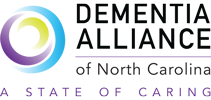 Thank you for your interest in making a difference now and in the future for Dementia Alliance of North Carolina and the thousands of families impacted by dementia in our state. Dementia Alliance of North Carolina is committed to improve the lives of all North Carolinians impacted by dementia, engaging and empowering them through support, education and research. All of our programs are built around a foundation of CARE – providing Comfort, Assistance, Resources and Education for individuals and families living with Dementia. Through our CARE approach, we seek to help North Carolina become a state of caring for caregivers and individuals living with dementia.
Thank you for your interest in making a difference now and in the future for Dementia Alliance of North Carolina and the thousands of families impacted by dementia in our state. Dementia Alliance of North Carolina is committed to improve the lives of all North Carolinians impacted by dementia, engaging and empowering them through support, education and research. All of our programs are built around a foundation of CARE – providing Comfort, Assistance, Resources and Education for individuals and families living with Dementia. Through our CARE approach, we seek to help North Carolina become a state of caring for caregivers and individuals living with dementia.
Giving through your estate and financial plans can take many forms, but the simplest way to accomplish this is through a gift in your will or living trust. Gifts through your retirement plans or life insurance are other options. Most of these types of gifts will feature various tax benefits. They all, however, have one thing in common: Each gift makes an impact for families living with dementia in North Carolina.
Are you looking to make a lasting impact with the Dementia Alliance of North Carolina of North Carolina? We would be honored to talk with you more about different opportunities to remember the Dementia Alliance of North Carolina in your estate and financial planning.

